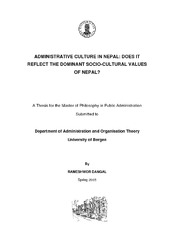| dc.description.abstract | Nepalese bureaucracy is accused of being inefficient, corrupt, non-transparent and irresponsible. It is also said that Afno Manchhe and Chakari, which is deeply rooted in Nepalese social values, is also highly institutionalized in the Nepalese administration. Many studies have revealed that socio-cultural values affect the administrative system of a country. Upon this background, this study aimed to map the existing administrative culture in Nepal and examine whether socio-cultural values of Nepal affect administrative culture. This study revealed that Nepalese civil service is characterized by values that may be termed bureau-pathology. This is because the administration is guided strongly by particularism rather than universalism, ascription rather than achievement, and authoritarian rather than participatory values. One of the basic characteristics of the Nepalese bureaucracy is that it manifests elements of both the classical and political bureaucracy. More precisely, this study revealed that civil servants do not follow prescribed rules while make administrative decisions. Most often, administrative decisions are influenced by informal sources rather than formal rules, i.e. political influence, bribery, personal connection (Afno Manchhe), and Chakari. Civil servants are guided by status oriented and empire building attitudes. Common administrative norms include slow decision making processes, maintaining high levels of secrecy, ritualized official work, and shifting responsibility to others. There is also great emphasis on process rather than results. In addition, high power distance between superior and subordinates, centralized and non-participatory decision making processes are basic features of the Nepalese administration. This study also uncovered the close relationship between societal culture in Nepal and administrative culture. In fact, Nepalese societal culture is determined by the caste system, family structure, and other belief systems that are ultimately reflected in the administrative system. Both the Nepalese society and administration are dominated by high caste Hindu male Brahmin, Chhetri and Newar. There are two challenges to the current public administration in Nepal. First, given the strong influence of dominant societal culture in shaping administrative culture, how can this sector be reformed. Second, what changes would be introduced in order to make public administration maintain its identity while at the same time catering for the needs of development and citizens. | en_US |
